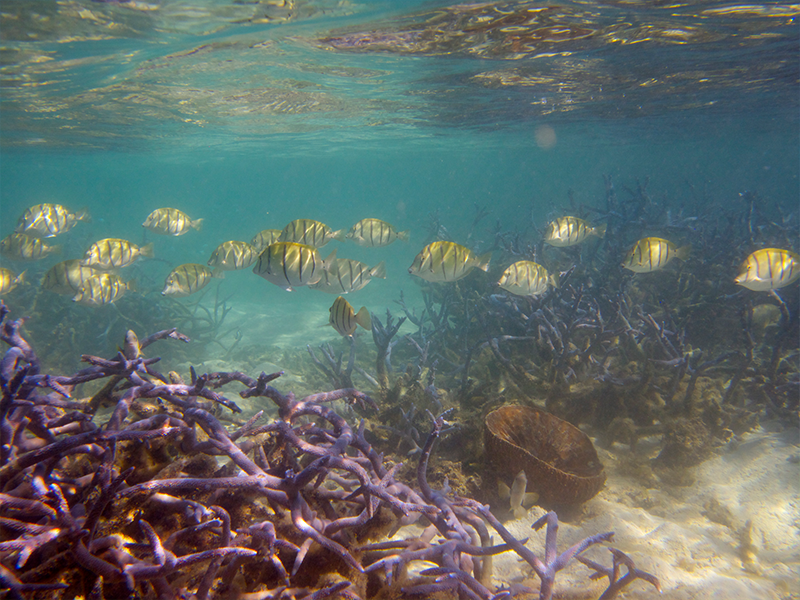Coral reefs are 50% less able to provide food, jobs, and climate protection than in 1950s, putting millions at risk
September 17, 2021

September 17, 2021

The capacity of coral reefs to provide ecosystem services relied on by millions of people worldwide has declined by half since the 1950s, according to a new University of British Columbia-led study.
The study offers the first comprehensive look at what climate change, overfishing, and habitat destruction of coral reefs mean for their ecosystem services, or the ability of the reef to provide essential benefits and services to humans, including food, livelihoods, and protection from storms. Overall, the findings showed that the significant loss in coral reef coverage has led to an equally significant loss in the ability of the reef to provide these services.
Other findings are equally bleak: the authors found that global coverage of living corals had declined by about half since the 1950s and consequently, the diversity of species had also declined, by more than 60 per cent.
“It's a call to action – we’ve been hearing this time and time again from fisheries and biodiversity research,” said lead author Dr. Tyler Eddy, who conducted the research as a research associate at the UBC Institute for the Oceans and Fisheries (IOF). Now a research scientist at the Fisheries & Marine Institute at Memorial University of Newfoundland, Dr. Eddy said the continuing decline of healthy coral reefs and the quality of habitat they provide is contributing to a global decrease in provision of ecosystem services for the millions of people who rely on them. “We know coral reefs are biodiversity hotspots. And preserving biodiversity not only protects nature, but supports the humans that use these species for cultural, subsistence and livelihood means.”
The researchers analyzed trends for coral reef systems and associated ecosystems worldwide, combining datasets from coral reef surveys, estimating coral reef associated biodiversity, fisheries catches and effort, fisheries impacts on food web structure, and Indigenous consumption of coral reef associated fish. They also analyzed global and country level trends in ecosystem services and how they compared to trends for small island developing states.
As well as declines in reef coverage and biodiversity, the researchers found catches of fishes on coral reefs peaked in 2002 and have steadily declined ever since, despite an increase in fishing effort. The catch per unit effort, often used as an indication of changes in biomass, is now 60 per cent lower than it was in 1950.
“This study speaks to the importance of how we manage coral reefs not only at regional scales, but also at the global scale, and the livelihoods of communities that rely on them,” said senior author Dr. William Cheung, professor and director of IOF.
The findings led the researchers to conclude that continued degradation of the reef in years to come now threaten the well-being and sustainable development of human communities on the coast that depend on the coral reef.
Fish and fisheries provide essential micronutrients in coastal developing regions with few alternative sources of nutrition, Dr. Eddy said, with coral reef biodiversity and fisheries taking on added importance for Indigenous and coastal communities, where important cultural relationships with reefs exist and coastal Indigenous communities’ consumption of seafood is 15 times higher than non-Indigenous communities.
The study highlights that Indigenous and coastal communities -- in this case in the tropics -- are being unfairly hurt by the world's actions, said co-author Dr. Andrés Cisneros-Montemayor, an IOF research associate at the time of the study, and now an assistant professor at Simon Fraser University. “It's heart-wrenching for us to see photos and video of wildfires or floods, and that level of destruction is happening right now all over the world's coral reefs and threatening people's culture, their daily food, and their history. This isn't just an environmental issue, it's also about human rights.”
“Finding targets for recovery and climate adaptation would require a global effort, while also addressing needs at a local level, said Dr. Cheung. “Climate mitigation actions, such as those highlighted in the Paris Agreement, the Intergovernmental Science-Policy Platform on Biodiversity and Ecosystem Services and the Intergovernmental Panel on Climate Change, all call for integrated action to address biodiversity, climate, and social challenges. We are not there yet.”
We honour xwməθkwəy̓ əm (Musqueam) on whose ancestral, unceded territory UBC Vancouver is situated. UBC Science is committed to building meaningful relationships with Indigenous peoples so we can advance Reconciliation and ensure traditional ways of knowing enrich our teaching and research.
Learn more: Musqueam First Nation